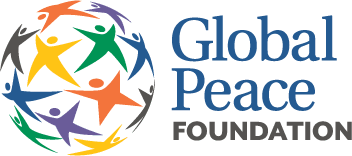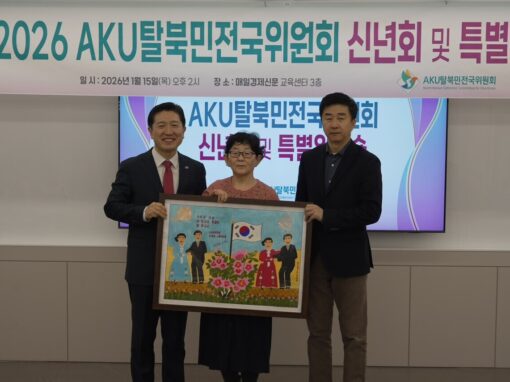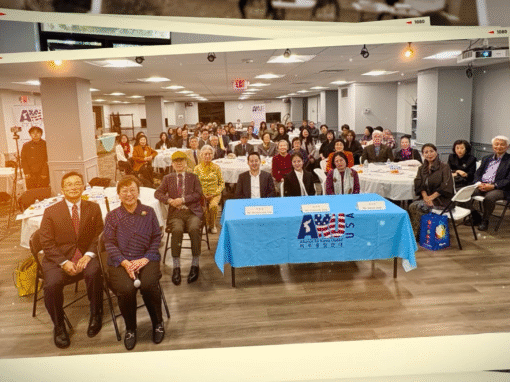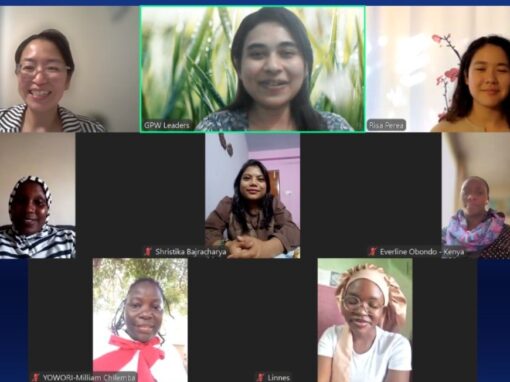Global Peace Foundation, Co-operation Ireland, Glencree and Action for Korea United organized an International Forum on One Korea: Insights from the Ireland Experience in Croke Park, Dublin, Ireland on Nov 27, 2018. The convening brought practitioners, religious leaders and political representatives involved with the peacebuilding efforts in Northern Ireland and the Republic of Ireland and Korean representatives.
The forum explored insights from the Ireland experience including historical insights, parallels, peace building approaches that work, perspectives on identity, human rights, self-determination, common history, centenaries and celebrations, shared values, contribution of community and voluntary groups and collaborative practices. There were three main themes that presented themselves throughout the day: 1. What does Pre-Unification look like 2. Unification 3. Post-Unification
The relationship between the Irish Isle and the Korean Peninsula may seem distinct, but there are lessons that can be learned from the efforts of Northern Ireland and the Republic of Ireland that can be applied to North Korea and South Korea. Both Northern Ireland and the Republic of Ireland and North Korea and South Korea experienced foreign interference from more dominant states, Great Britain and Japan, respectively. These divides fueled regional conflicts that aligned with colonial powers to increase their own prominence, further dividing the state. When later officially separated by foreign powers, Ireland in 1921 by Great Britain, and Korea by the Soviet Union and the United States in 1945, some of the divisions regarding territory became codified into history. It is these divisions that remain the source of conflict in both areas today. The Global Peace Foundation, and its partners from Action for Korea United, advocate that the only way to bridge these divisions is to establish a unified Korea. Ireland itself remains distinct countries—Northern Ireland and the Republic of Ireland—efforts to decrease the violence of the “so-called” Troubles remain a great lesson for those looking to further develop cross-border relations.
Pre-Unification: Increased Global Awareness
In contrast to Irish efforts at peacebuilding, there are many geopolitical factors involved with the Korean process for peace and possible unification. It was agreed that for a united Korea to be achieved, all of the global players, i.e. China, Russia and the US, would need to work together with Korean leadership. It should be noted, however, that the Korean practitioners emphasized the need for self-determination of the Korean people in the peace process.
The building of relationships with other countries that have gone through peace processes was seen as important for practitioners discussing peace in Northern Ireland. It was agreed amongst the practitioners that the Global Peace Convention (GPC) in Seoul, Korea (February 26-March 1, 2019) is the perfect opportunity to raise awareness on a global scale and learn new ideas from other peace organizations. Accompanying the GPC will be the centenary of the peaceful protests that occurred thought-out Korea on March 1, 1919 for Independence from colonization by the Japanese Empire.
Pre-Unification: Role of Civic Society
Many of the practitioners involved in the conference were individuals who comprise civic society. The overwhelming sentiment was that any attempt at peace without the assistance of civic society would fail. One practitioner stated, “Peace is too important to be left to the politicians.” With this in mind, we can understand the unique position of civic society to support the people at the micro level and critique the government and other power brokers (businesses, international community members, religious institutions, etc.) at the macro level, uncovering the corruption that stalls peace processes. The North Korean people do not have the same elaborate network of South Korean civic groups coordinated to promote change. If Korea were to unify, convened practitioners inquired if this “peace” would similarly benefit Northern Koreans, less able to direct the efforts of the peace—discussing unequal peace and “peace for whom?” Careful consideration of this imbalance will be important to ensure that isolation and lack of recognition for experienced trauma (perceived or actualized) does not jeopardize gains in peaceful relations. Northern Ireland has taught us that it is these considerations that will lay the foundation for sustainable peace.
Pre-Unification: Single Vision
What is our dream? How can we unify without a shared vision? The delegation from South Korea was intent that there be a unified, single vision for change, mobilizing the Korean people to act in a way similar to America’s Founding Fathers. They attributed the successes of the 1919 March 1st Movement to the unified vision of creating an Independent Nation rooted in the 5,000-year founding mythology of Korea called Hongik Ingan, or “living for the greater benefit of humanity,” which was a guiding principle for the March 1, 1919 Independence movement that united Koreans during the era of Japanese occupation. It was suggested that the motto of ancient Korea be utilized as the basis for a singular vision that can positively frame the new peace of the peninsula. The single vision in Northern Ireland about the need to stop the violence is what enabled the Agreement of 1998 to begin formal proceedings.
Pre-Unification: Young People
It was a surprise to the Irish practitioners that the majority of the South Korean youth are against the unification of the two Koreas. The concerns of young people over the economic impact should not be seen as invalid. Before unification is possible, it is imperative that these young people concerned with job displacement are incorporated into the process and a plan is set-up to protect from economic vulnerability. As can be learned from Northern Ireland, it is the young people who will continue the peace. Their voices and needs are required to be heard and incorporated if peace is to be supported.
Pre-Unification: Leadership
Leadership of both North Korea and South Korea is critical to foster strong and sustainable relations among citizens. These leaders will need to be dynamic and willing to work with one another, like the late Martin McGuinness and Dr. Ian Paisley, John Hume and David Trimble
of Northern Ireland. International leadership is also imperative to ensure that these leaders are being held accountable to promote sustainable peace and can seek support from those who have gone through similar processes in their home countries, like the negotiations with President Bill Clinton, Prime Minister Tony Blair, and Senator George Mitchell.
Unification: Role of Civic Society
It is imperative that these organizations work in a coordinated effort to provide support to the people undergoing transition. These support structures are what will build the foundation for the public at-large to unify in the negotiations of everyday life, not discussed in the formal agreements of government. Practitioners discussed how it was the community and volunteers who kept the people together in Northern Ireland, informed by their keen awareness of what was taking place on the ground.
Unification: Timing
It is important that both South Korea and North Korea are flexible with timing. That being said, practitioners were wary that too much flexibility would not enable any progress and that some structure need be provided to encourage movement and discussion. It should also be noted that no timeline is fixed. The signers and negotiators of the Ireland Good Friday Agreement of 1998 could not have foreseen the absence of the Northern Ireland Assembly in Stormont and the implications of Brexit (The United Kingdom’s exit from the European Union). Those engaged in the process must be flexible throughout unification to adapt to these unforeseen circumstances and provide deadlines able to move with the people and politics of their country.
Unification: Commonalities
Even though, both countries are politically different from one another, the practitioners suggested to that there were similarities among the Korean people. All Koreans speak Korean, North and South. They share the same origin story, way before Japanese colonization and Western interference. One practitioner remarked that Ireland was never unified, as there has always been fighting amongst the tribes. Korea has always been one tribe—an identity that will be useful in the unification process.
Unification: Fears
The fear expressed during the unification process is that this new place of peace and unity will not be maintained. This derives from concerns regarding the financial burden of assuming North Korea into the South Korean economy and the increased costs of healthcare and education provision. Particularly for North Korea, there is also concern regarding their nuclear capabilities and the armaments of the demilitarized zone occupied by United States military. The Korea delegation focused on reconciliation. They stated that reconciliation would be the only way forward to address such fears and that South Korea would have the economy to unify with North Korea. Their claim was supported by the argument that North Korea can provide workforce and natural resources coupled with South Korea’s capital and technology. Similar debates are ongoing today in the Northern Ireland and Republic of Ireland context regarding healthcare and financing. What can be learned from the experiences of practitioners is the significance of understanding these fears and a need to comprehend their origins so that successful unification can take place.
Post-Unification: Dealing with the Past
South and North Korea can learn from the achievements and missteps of the legacy systems of other countries. The practitioners were in agreement that both South and North Korea would have to create a multi-layered system to empower the Korean people, “the process needs to be at the home and meet the needs of the people.” Many of the practitioners voiced that there should be a process of accountability for the human rights violations in North Korea. To recover these truths, the Korean citizens would have to agree on what the starting point in history would be to begin examination. A single vision was recommended to define truth, a difficult task when truth is viewed in binary truth and untruth terms, ignoring the layers within.
Practitioners posed the question of whether it was possible to draw a line in the sand and place the “past in the past” within the peace process. The practitioners concluded from their experiences in Northern Ireland that if the past was not discussed or was to be forgotten, it would catch up with the people and affect the ability to achieve peace long-term.
Post-Unification: Role of Civic Society
It will be civic society who remains on the ground after the international community has left and the government moves on to run a country no longer at war with itself, seen in the organizations of Northern Ireland. If reconciliation is to occur in the form of a united Korea, civic society will similarly be the only ones who can facilitate the social peace legalese cannot. Practitioners advocated that it is these structures of civic society that will help move the people forward, matching sentiments of formal agreements negotiated by the political elite with the sentiments of the everyday citizen, like the grassroots work of advocates in Northern Ireland following the Peace Agreement of 1998.
Post-Unification: Laws and Infrastructure
Unlike North and South Korea, Northern Ireland and the Republic of Ireland have similar legal and political systems. It was articulated at the conference that a new legal system must be created to benefit both the North and South. The historic understanding for the talent of Korean builders will similarly be utilized to develop infrastructure across the peninsula.
Post-Unification: Unequal Power
The Communist structures of North Korea place them in an unequal position to the democratic and wealthy location of South Korea. The vastly different GDPs and institutions in place in both states, i.e. education, health care, infrastructure (roads, public transport etc.), will make hearing the North Korean voice difficult at the negotiating table. This inequality must be taken into consideration if true unity is to be formed. Northern Ireland is currently undergoing a process itself to self-examine similar inequalities within their country to achieve a fuller peace.
At the end of the conference, one practitioner wisely stated, “no two processes are the same. Northern Ireland built its peace in pieces, slowly and bit-by-bit, like a jigsaw puzzle.” This practitioner then stated that it would be the maintenance of continuing to add these pieces that would complete the peace. As South Korea works to build peace with North Korea as a united Korea, it is important to understand this lesson—these are bits of information from the standpoint of practitioners operating in Northern Ireland and the Republic of Ireland.
Their work is still ongoing and requires the continued persistence of the people to address the legacy left behind by partition, the role of civic society and the need for increased global awareness, amongst many others, as mentioned above. Their persistence is informed by their experiences in Ireland and the lessons from other post-conflict societies who have given input to build relationships across the island. It is with these understandings that the leaders and citizens on the Korean peninsula can work together to achieve their own peace.
Conclusion
At the end of the conference, one practitioner wisely stated, “no two processes are the same. Northern Ireland built its peace in pieces, slowly and bit-by-bit, like a jigsaw puzzle.” This practitioner then stated that it would be the maintenance of continuing to add these pieces that would complete the peace. As South Korea works to build peace with North Korea as a united Korea, it is important to understand this lesson—these are bits of information from the standpoint of practitioners operating in Northern Ireland and the Republic of Ireland.
Their work is still ongoing and requires the continued persistence of the people to address the legacy left behind by partition, the role of civic society and the need for increased global awareness, amongst many others, as mentioned above. Their persistence is informed by their experiences in Ireland and the lessons from other post-conflict societies who have given input to build relationships across the island. It is with these understandings that the leaders and citizens on the Korean peninsula can work together to achieve their own peace.
Discussants
• Inteck Seo, Co-Chair, Action for Korea United • Mr. Han Phil Cho, Co-Chair, Action for Korea United • Dr. Tony Devine, VP, Education, Global Peace Foundation; President, Global Peace Foundation – Ieland • Barry Fennell, Youth & Community Facilitator, Cooperation Ireland • Dr. Alan Largey, Project Manager, Cooperation Ireland • Eamon Rafter, Learning Co-Ordinator, Glencree, Ireland • Seamus Farrell, The Junction, Northern Ireland. Board Member, Community Dialogue, Belfast, Northern Ireland • Fr. Gary Donegan, Tobar Mhuir Retreat, Crossgar • Rev. Dr. Gary Mason, Director Rethinking Conflict • Senator Mark Daly, Fianna Fail, Republic of Ireland • Thomas Connolly, Queens University, Belfast, NI • Elizabeth Charash, Queens University, Belfast, NI • Carol Dunbar, Cooperation Ireland, Dublin • William Barrett, Desk Officer, Conflict Resolution Unit, Department of Foreign Affairs and Trade, Republic of Ireland (Observer) • Dr. Michael Casey, British and Irish Trading alliance (B.I.T.A.), Irish Research Council (I.R.C.) and the Ireland-U.S. Council (I.U.S.C.) (Observer)
Report Prepared by: Elizabeth Charash and Tom Connolly, Students, The Senator George J. Mitchell Institute for Global Peace, Security and Justice, Queens University Belfast, Northern Ireland
Partners




